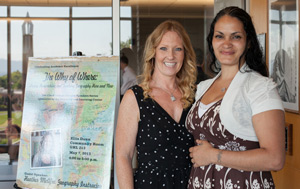The Why of Where
Geography instructor Heather McAfee presses to challenge stereotypes

Clark College student Heidi Mason, right, told the audience that Heather McAfee, left, helped her see the connection between geography and her Women’s Studies courses.
Heidi Mason told the audience that Instructor Heather McAfee helped her see the connection between geography and her course work in Women’s Studies, and that her 17-year-old son visited one of McAfee’s classes and soon afterward enrolled at Clark.
Anyone who thinks geography is nothing more than memorizing capitals has a lot to learn from McAfee. In a presentation that ranged from personal travels to instructional theory, McAfee described her cross-disciplinary approach to teaching geography during the spring quarter installment of the Faculty Speakers Series in early May.
During his opening remarks, Vice President of Instruction Tim Cook announced that McAfee, who joined the Geography department in 2012, had recently accepted an offer for a tenure-track position. In addition to a master’s degree in political science from the University of Oregon, McAfee holds degrees from Pikes Peak Community College in Colorado Springs and a bachelor’s in geography from the University of Colorado. She serves on the board of the American Association of Geographers’ Community College Affinity Group and volunteers with the Immigration & Refugee Community Organization in Portland, Ore.
McAfee spoke of her work as an International Red Cross volunteer during the Kosovo conflict in the 1990s and civilian contractor in Iraq in 2008. She said she found herself pondering questions of displacement and identity—wondering where the refugees would go and what their lives would be like without a home and a sense of belonging.
In her graduate research, McAfee discovered a disproportionately small number of Iraqi refugees coming to the United States compared to Vietnamese refugees 40 years ago. McAfee also found that Portland has more Iraqi refugees than any other city in the U.S. McAfee described how her own identity as a cultural feminist geographer helps her teach her students how geography affects people every day.
“I ask students to look around the world and not just memorize place names and capitals,” she said. “I ask them to look at maps about stereotypes and to challenge those stereotypes.”
As public funding for the study of geography dwindles and the need for global understanding increases, McAfee urged her colleagues across disciplines to incorporate techniques like using photos and Google Earth to give added meaning to places related to topics.
“Everything has a location,” she said, “and when we bring meaning to a space it becomes a place.”
The Clark College Faculty Speaker Series showcases recent experiences that have enriched both the life and teaching of a Clark faculty member. Faculty members share their developmental experiences with the college community— and members of the community at large—while addressing some of today’s most intriguing issues. Established by Clark College with support from Clark College Foundation, the series honors individual faculty members and celebrates academic excellence.
The next presentation of the series will occur during fall quarter 2013. Professor Erika Nava will recount her unique approach of teaching an online Spanish class from Mexico.

